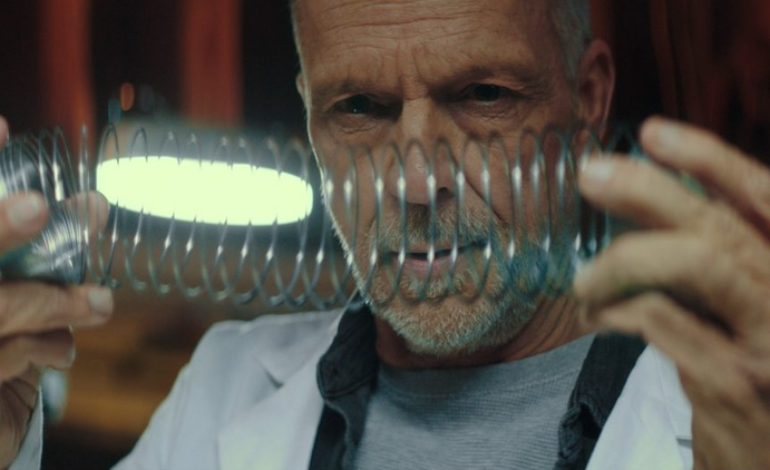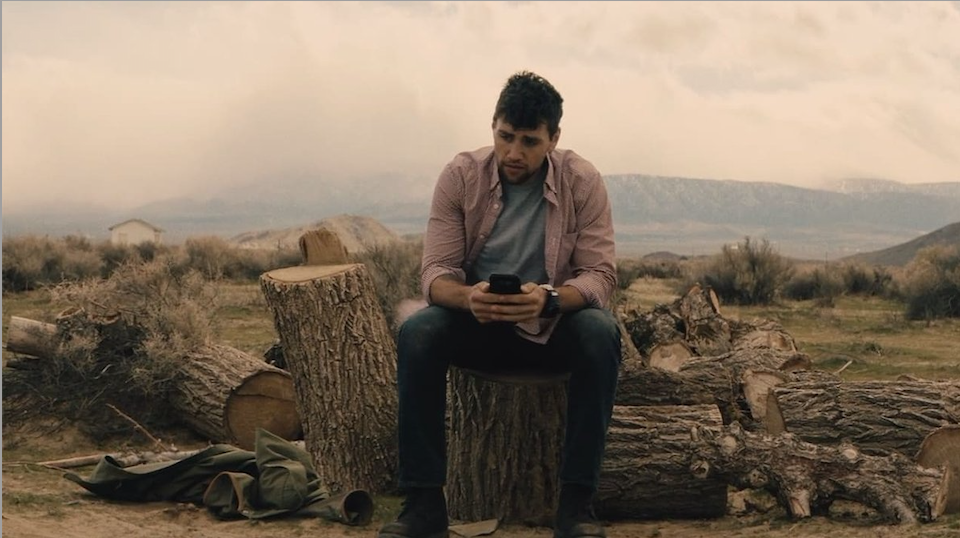

Directed by Arvi Ragu in his feature directorial and writing debut, and co-written by Ragu and Gary D. Houk in his writing debut, Cerebrum (2021) follows Tom Davis (played by Christian James) who, to make ends meet, signs on as a guinea pig at a home-based lab. However, when he commits a crime he cannot remember, he must risk his own sanity to reveal the truth.
Just as a brief warning there will be some plot spoilers. I feel like there were two competing movie ideas in this film. On the one hand, there was the sci-fi thriller concept of this watch that allows you to transport other people’s memories/consciousness into another person’s body, and someone using that technology to do terrible things while another person (in this case Tom) is on the run from the law trying to piece together what happened and why he can’t remember it. On the other hand, there is this more character-based, or introspective, sci-fi story in which this one man named Kirk Davis (played by James Russo) who had to endure first hand someone he loved afflicted with Alzheimers, and this tries to illegally develop this technology in order to help make memory loss a thing of the past. Then, when his son Tom gets roped into his father’s experiments and learns the truth about his mother, he tries his best to carry on his father’s research. At this point his father has died, and thus Tom can only communicate with his father through the technology Kirk has developed of memory transference, all the while fearing that the same disease that took his mother is also affecting him.
I think as two separate films, these ideas really could’ve been more intricatly crafted and developed. However, as it stands, this movie really does not work, mainly because you have these two competing ideas, and because neither of them have the time to develop, it just leads to a film that feels very surface level and all over the place. There are these moments where the film tries to be very heartfelt and emotional to them and has to go right to the next scene where it becomes a sci-fi mystery thriller, and that tonal shift just isn’t really there, or isn’t nearly as heightened as it probably should’ve been. So you live in this strange limbo throughout the film of it not really knowing that there are these two competing tones and ideas at odds and clashing.


A lot of the fundamental issues with the film I think primarily come from the script as well as the direction. The reason why it comes across as two ideas jammed together into one movie is because of the weird pacing of the film. The initial character tension comes from the father and Tom, as Tom is only helping his father because he needs money. Tom hates his father for taking him away from his mother at a young age, and then not being there for him after her death because his father is always focused on his research. However, it’s about 30 minutes in when Tom learns the truth and forgives his father, so that tension is gone and it’s not even halfway through the film. Then, it’s about 45 minutes – nearly halfway – through the film when the main conflict finally kicks in. So for a good 15 minutes or so there’s little to any tension or inner conflict with Tom, and what little there is between Tom and Kirks lab assistant, Bhubanesh Kumar (Anirudh Pisharody) is very subdued and certainly not helped by some very cliched and on the nose dialogue writing – a problem that persists throughout the film.
Outside of the poor pacing in the script, which I think also contributed to shallow conflict and cliched and/or on the nose dialogue writing, I think a vast majority of the other problems come from the direction. Arvi Ragu both directed and co-wrote the script with Gary D. Houk. As someone unaware of Arvi specifically previous works, I really think that he was not successful at building suspense and tension. The more emotional scenes between the father and the son worked better, but from a script point because their resolution was so early on in the film and the emotional conflict that followed wasn’t nearly as developed or emphasized as it should’ve been, the latter emotional moments didn’t really satisfy as much as they were meant to. However, I think that the film from a script and direction vantage point was just not successful in building up suspense, mystery and tension, mainly because the film has the desire to have to reveal everything in dialogue. Early on Kirk says to Tom how devastating memory loss is to families, so when Tom learns 20 minutes later his mom had Alzheimers, it is not even a twist because of how obvious the dialogue made it. When Tom also learns about what he did, there is also no debate whether or not Tom has Alzheimers because so much about the nature of the murder is already made so obvious to the audience so there’s no twist or shocking reveal. Even when it comes to building tension, when Tom sees the video of him doing what he did, there’s no cut to Tom’s reaction or him looking on in horror at what he has done. The video just plays and we just cut to a medium shot of the cop and Tom and Tom looks just completely calm and collected.


This failure from a script and execution point is also made obvious in the final act. No spoilers for how the film ends, but there’s again a really interesting and clever idea for a final confrontation here, where no one is sure who is who. However, the film has this constant desire to always show it’s cards, so at no point is there any tension because the audience is constantly aware of who is who and where someone is at all times. Part of this lack of tension is also due to some really flat direction and staging.
The performances were a mixed bag, something I think, again, is due to some weak direction. The reason I suspect this is that Alexxis Lemire (The Half of It, The Art of Murder), James Russo (Django Unchained, My Own Private Idaho) and Christian James (Hell Fest, “Nashville”) especially had some really spectacular moments where they demonstrated their acting range. Anirudh Pisharody (“Last Man Standing,” “9-1-1,” “The Goldbergs”) I could tell had some really good acting chops but unfortunately I don’t think his character was used or developed nearly as well as he could’ve been. I think this good amount of talent is undermined by some really flat direction and also some really strange choices that I feel really limited some of the more heightened emotional scenes, not to mention some really bad dialogue that some of the characters, especially Bhuvanesh, are given.
Verdict: 1.5 out of 5 Stars
Despite some interesting ideas, beautiful moments of cinematography, solid moments of acting, and an ambitious sci-fi premise, Cerebrum (2021) unfortunately does not work. Uneven performances, flat direction, and thematically incohesive script that is all over the place in regards to it’s tone, plotting, and pacing, really just bog this film to the point where very few moments land the way they should. There’s this great line that Kirk says to his son later on in the film which is something like “I spent so much time trying to save other people’s memories that I forgot to create some of my own.” It’s a fantastic line which I think really sums up the wasted potential of this film and it’s premise.
